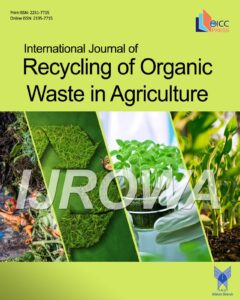Organic manure production from cow dung and biogas plant slurry by vermicomposting under field conditions
Authors
Abstract
Background: Vermicomposting is a biological process which may be a future technology for the management of animal excreta. This study was undertaken to produce vermicompost from cow dung and biogas plant slurry under field conditions. To achieve the objectives, two vermicomposting units containing cow dung (CD) and biogas plant slurry (BPS) were established, inoculated with Eisenia fetida species of earthworm and allowed to be vermicomposted for 3 months. Results: After 3 months, the vermicompost was harvested and characterized. The results showed that the vermicompost had lower pH, total organic carbon (TOC), organic matter (OM) and carbon/nitrogen ratio (C/N ratio) but higher electrical conductivity (EC), nitrogen, phosphorous and potassium (NPK) content than the raw substrate. The heavy metal content in vermicomposts was higher than raw substrates. Conclusions: During vermicomposting, the CD and BPS were converted into a homogeneous, odourless and stabilized humus-like material. This experiment demonstrates that vermicomposting is an environmentally sustainable method for the management of animal excreta.




